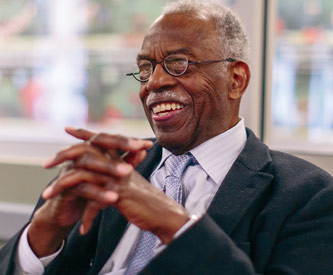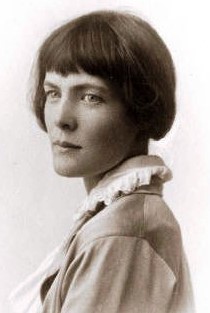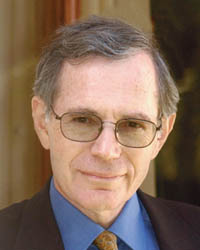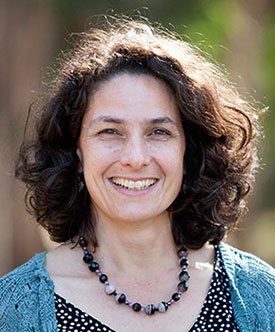Honorary degree recipients named
Interim Lehigh President Kevin L. Clayton and the university’s Board of Trustees have announced that honorary degrees will be conferred on five individuals at commencement exercises on Monday, May 18.
In addition to the awarding of an honorary Doctor of Humane Letters degree to commencement speaker and celebrated biographer, journalist and public policy thought leader Walter Isaacson, the following individuals will be honored at Lehigh’s 147th commencement ceremony:
- Costel “Cos” Denson ‘56, one of the most respected minds in the world in the field of fluid mechanics, will receive an honorary Doctor of Science
- H.D., Hilda Doolittle, an American poet, novelist and memoirist, will receive a posthumous honorary Doctor of Letters
- Eric Foner, the DeWitt Clinton Professor of History at Columbia University, will receive an honorary Doctor of Humane Letters
- Nicole King, an American biologist and faculty member at the University of California, Berkeley in molecular and cell biology and integrative biology, will receive an honorary Doctor of Science
Foner will also deliver the Baccalaureate address on Sunday, May 17, in Packer Chapel.
“We are honored to be able to recognize the incredible contributions of these accomplished individuals,” said Clayton. “They are leaders in their fields, and they serve as excellent role models for our young graduates. I would like to thank the members of the Faculty Honorary Degree Committee for their dedicated work in selecting such well-deserving and inspirational honorees.”
Lehigh bestows honorary degrees to recognize exceptionally accomplished individuals who epitomize the integrity, intelligence and creativity of Lehigh degree recipients. These special degrees bring honor to the institution and to the recipient, according to Jesus Salas, who holds the Francis J. Ingrassia Professorship in the Perella Department of Finance and chairs the Honorary Degree Committee.
Salas said the 2015 recipients are “a celebration of the present, past, and future of Lehigh University. The honorees reflect the push by Lehigh to embrace diversity of backgrounds and thought. The road is not easy but it is the better road to take."
Issacson’s selection as commencement speaker was announced last November. He is the author of Steve Jobs (2011), Einstein: His Life and Universe (2007), Benjamin Franklin: An American Life (2003), and Kissinger: A Biography (1992), and coauthor of The Wise Men: Six Friends and the World They Made (1986).
His most recent book is The Innovators: How a Group of Hackers, Geniuses, and Geeks Created the Digital Revolution, a biographical tale of the people who invented the computer, Internet and other great innovations of our time.
A pioneer at Lehigh and beyond
Costel ‘Cos’ Denson was the first African-American student to graduate from Lehigh University.
He earned a Bachelor of Science degree in chemical engineering from Lehigh in 1956, and followed with a master’s degree in chemical engineering from Rensselaer Polytechnic Institute in 1960. He earned his Ph.D. in chemical engineering from the University of Utah in 1965.
After a long and successful career at General Electric (GE), he joined the faculty at the University of Delaware, serving as professor of chemical engineering, interim dean of engineering and vice provost for research.
He has launched two companies based on technology he himself developed. He is currently managing member of Costech Technologies, LLC, a company that advises on environmental issues. Denson has served on numerous advisory boards, more recently including the U.S. Department of Defense: Scientific Advisory Board, the U.S. Environmental Protection Agency: Science Advisory Board, and the National Research Council: Board on Environmental Studies and Toxicity.
He also has been a visiting professor at the University of California at Berkeley, the University of Naples and Lehigh University.
He was active in the Society of Rheology, the American Chemical Society, the American Institute of Chemical Engineers and the American Association for the Advancement of Science, and served on a 12-member executive committee of the Society of Plastics Engineers, an organization of some 38,000 members.
Denson was a member of a National Science Foundation panel judging major proposals from across the country submitted under a teacher enhancement program in the area of mathematics, science and technology education.
His many honors include the Thomas H. Chilton Award of the Wilmington section of the American Institute of Chemical Engineers and the International Award for Research of the Society of Plastics Engineers.
The author or co-author of more than 30 articles in professional journals, Denson holds two patents.
The Lehigh Valley’s most important literary figure
H.D. (born Hilda Doolittle) lived from 1886 to 1961 and is known for her impressive body of work as a modernist poet and novelist.
The daughter of a Lehigh professor, she drew on her experiences of Bethlehem and Lehigh throughout her long writing life. Her Moravian heritage features prominently in her two memoirs, The Gift and Tribute to Freud. She is considered the Lehigh Valley's most important literary figure.
H.D. moved to London in 1911, where Ezra Pound encouraged her poetic career. Her publications earned her a central role within the emerging Imagist movement. She had a deep interest in Ancient Greek literature, particularly Sappho and Euripides. In the 1930s, she became one of Sigmund Freud’s most famous pupils. All these experiences shaped her most celebrated volumes of poetry, Trilogy and Helen in Egypt.
H.D. lived in Switzerland for the last decade of her life, but her ashes reside in Bethlehem’s Nisky Hill Cemetery. Visitors to the grave often leave a tribute of shells, an important symbol for the poet.
As was the case with many earlier women writers, her importance was recovered by feminist scholars in the 1970s, many of whom have visited Lehigh to lecture on H.D. in the last decade.
Now the subject of many books, articles, and dissertations, H.D. was the focus of a small conference hosted by Lehigh’s English department a decade ago and will be the center of an international conference as part of Lehigh's 150th celebration in Fall 2015, which will include many of the feminist scholars who established H.D.’s place in the canon of American literature.
Unapologetic about her bisexuality, she also became an icon for both the gay rights and feminist movements when her poems, plays, letters and essays were rediscovered during the 1970s and 1980s.
An expert on 19th century American history and the history of American race relations
Eric Foner, one of the country’s most prominent historians, earned the distinction of being one of a handful of scholars to have won the Bancroft and Pulitzer Prizes in the same year. He is one of only two individuals to serve as president of the three major professional organizations: the Organization of American Historians, American Historical Association, and the Society of American Historians.
An accomplished writer, his publications have concentrated on the intersections of intellectual, political and social history, and the history of American race relations.
Among his widely lauded books are: Free Soil, Free Labor, Free Men: The Ideology of the Republican Party Before the Civil War; Tom Paine and Revolutionary America; Nothing But Freedom: Emancipation and Its Legacy; Reconstruction: America's Unfinished Revolution, 1863-1877; The Reader's Companion to American History (with John A. Garraty); The Story of American Freedom; and Who Owns History? Rethinking the Past in a Changing World. His latest book, Gateway to Freedom: The Hidden History of the Underground Railroad, was published in early January.
Foner has also been the co-curator of two prize-winning exhibitions on American history: A House Divided: America in the Age of Lincoln, which opened at the Chicago Historical Society in 1990, and America's Reconstruction: People and Politics After the Civil War, which opened at the Virginia Historical Society in 1995 and traveled to several other locations.
The recipient of the Great Teacher Award from the Society of Columbia Graduates in 1991 and the Presidential Award for Outstanding Teaching from Columbia University in 2006, he was also named Scholar of the Year by the New York Council for the Humanities in 1995. In 2014, he was awarded the Gold Medal by the National Institute of Social Sciences. He is an elected fellow of the American Academy of Arts and Sciences and the British Academy.
He received his doctoral degree at Columbia, under the supervision of Richard Hofstadter.
A leading thinker in evolutionary biology
Nicole King studies the evolution of multicellularity and choanoflagellates, the origin and evolution of animal development, genome evolution and host-microbe interactions. Since 2013, she has served as lead investigator for a research project funded by the Howard Hughes Medical Institute (HHMI) that is examining how single-celled choanoflagellates differentiate and organize themselves into colonies.
According to the HHMI website, King was fascinated by evolution at an early age. "I learned that Earth's history is long and deep, and the Earth has changed. By studying the past we can learn something about how life has evolved and how things work today,” she said.
She is the recipient of numerous awards and honors for her work, including a 2005 MacArthur Fellowship “genius” award, which recognizes “talented individuals who have shown extraordinary originality and dedication in their creative pursuits and a marked capacity for self-direction,” according to the MacArthur Foundation website.
King has been recognized by the Pew Scholars Program in the Biomedical Sciences in 2004, was named a scholar of the Canadian Institute for Advanced Research’s Integrated Microbial Biodiversity Program in 2007 and a senior fellow for that program in 2012.
She lectures frequently on her research around the world, and most recently served as the keynote speaker for the Darwin Day Celebration at Washington University-St. Louis. This June, she will present at the 10th Anniversary Symposium of the Center for Integrative Genomics at the University of Lausanne in Switzerland.
She received her B.S. in biology from Indiana University in 1992, and conducted her graduate work at Harvard (A.M., 1996, and Ph.D., 1999), studying spore formation in Bacillus subtilis. After completing a postdoctoral fellowship at the University of Wisconsin–Madison in 2003, she accepted the position of assistant professor of genetics and development at the University of California, Berkeley.
She is also a faculty affiliate of the UC Berkeley Center for Integrative Genomics. Her research has appeared in such academic journals as Nature, Science, and Developmental Cell.
Posted on:





